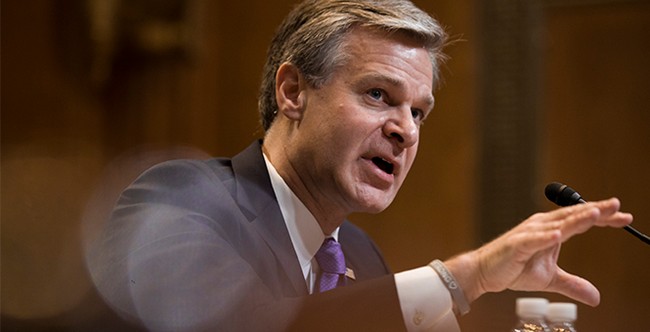
As FBI Director Christopher Wray’s resignation looms and President-elect Donald Trump taps Kash Patel to lead the bureau, criticism of the FBI’s alleged political motivations under Wray’s tenure has intensified.
Advertisement
From the labeling of Orthodox Catholic Americans as extremists, investigations into “anti-abortion extremists” as significant national security threats, the raid of Mar-a-Lago, the relentless January 6 witch-hunting, and the onslaught of rhetoric about white supremacy, the FBI appears to be politically motivated agency.
Kyle Seraphin, FBI agent turned whistleblower, contends that the FBI’s transformation was set in motion after 9/11, when the agency was granted sweeping reforms and expanded surveillance powers, which he believes laid the foundation for the politicization that followed.
Seraphin told Fox News Digital:
They use national security words to go after domestic individuals, and they have national security tools to look through your email to grab access to your comms, your phone calls, your text messages, your emails, and so on. They have the ability to look into your bank account and check out your financial records. And should they find evidence of a crime that is not related to what they’re searching for, the threat that they’re actually looking for?
Do we want people to get away with crime? No, but we want the government to be accountable to the freaking Bill of Rights.
Seraphin reveals that the operational culture of incentive-driven investigations and rewards for meeting metrics set for themselves bolster the perception of political bias within the FBI, saying:
What people are seeing is the natural outgrowth of letting FBI agents, or FBI senior management, forecast what they think the crime is going to be in the country, being incentivized to be correct because they’re going to be paid a monetary bonus at the end of it if they’re right, and then they go out and find that crime.
And so it looks very politicized. But I think that’s actually just a mistake of the correlation. In reality, what’s going on is the FBI is serving the interests of the senior management, which is that they want to get paid, and the easiest way to get paid is to go round up MAGA people, which they fall under this category of … anti-government, anti-authority, violent extremist.
Advertisement
Under President Joe Biden’s administration, the FBI has significantly ramped up its efforts against domestic terrorism, with a specific focus on white supremacy. This led to a dramatic increase in its investigative workload, with the number of cases jumping from approximately 1,000 to 2,700 between spring 2020 and September 2021, as reported by the Government Accountability Office. During this period, Wray gave congressional testimony that white supremacy represents the largest category of domestic terrorism.
FBI’s categorization of what constitutes domestic terrorism remains questionable. For instance, Seraphin pointed out that in New Mexico, “anti-abortion extremists” were considered the third-highest security threat. In a separate case, a Texas doctor faced four federal felony charges for revealing alleged transgender surgeries performed on minors at a hospital.
Additionally, pro-lifer prosecutions under the FACE Act have sharply increased under Biden’s administration, as I previously reported:
The Biden administration has indicted at least 37 individuals on charges under the Freedom of Access to Clinics (FACE) Act. In just over three years, the Biden Department of Justice (DOJ) has accounted for more than a quarter of all FACE Act charges in the law’s 30-year history. Notably, this includes the frequent use of a novel sentence enhancement, signaling a weaponization in the application of this law under the current administration.
Advertisement
With Kash Patel poised to take over, there’s a golden opportunity to address the FBI’s reputation for political bias. Patel could focus on dismantling incentive systems that encourage politically motivated investigations, and redefine what constitutes domestic terrorism. By fostering an environment of impartiality, protecting whistleblowers, and reevaluating high-profile cases with a non-partisan lens, Patel can guide the FBI back to its core mission of safeguarding national security.

